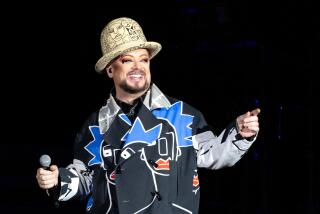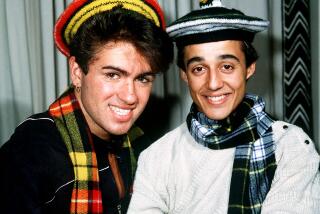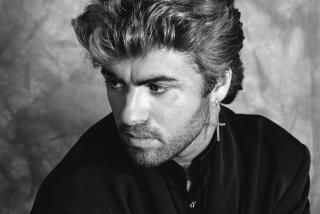On the sunny side
- Share via
The tannest man alive isn’t so bronze these days.
As George Hamilton opens the door of his tony Wilshire Corridor condo, his Super Swarthiness appears on the pale side, with even a hint of freckles on his face.
What happened? Is tanning no longer part of his daily regimen?
“I find I don’t have the time right now,” joked the still lanky 69-year-old. “When I was working constantly in films, you really had to keep your tan. Cary Grant and I talked one day, and he said a tan is the greatest thing in the world because you don’t have to wear makeup. Then I did a western with Glenn Ford years later, and he said, ‘Makeup is an hour’s waste of time. Just sit outside here in the morning.’ ”
Hamilton, who spends most of the year in Palm Beach, Fla., is in town to discuss his self-deprecating and witty autobiography, “Don’t Mind If I Do,” which he wrote with William Stadiem. He’s the first to admit that his life has been “absolutely outrageous.” Hamilton had a wild upbringing with a much-married mother who traveled the country with her three sons looking for love and a father for her children. Along the way, he lost his virginity by the time he was 12, became a movie star before he was 20 and bought booze for Robert Mitchum while making his first MGM picture.
“Films were pale to what my life was,” Hamilton said.
Though he’s had tragedies in his life, such as the alcoholism-related death of his older brother Bill, the book isn’t a tell-all weepie. “There is an old expression: Life to the feeling man is a tragedy and to the thinking man a comedy,” he noted. “I never copped a plea on good behavior. I never took it that way. I remember sitting with [David] Niven and listening to him tell stories. Michael Caine, I love listening to Michael’s stories. And that is the way I saw my life. The joke was always there.”
He got some of that from his late mother, Teeny, who fell victim to dementia as she entered her 80s. “My mother used to say, ‘All of my old friends are becoming new.’ It’s all about perception, and we would laugh at it.”
He recalled the time when a plastic surgeon called him to say Teeny was in his office and wanted to have her breasts and face lifted. “You could look at it as this tragic thing and say this is a woman who is trying to preserve her youth,” he says.
But Hamilton didn’t see it that way. “The doctor called and said, ‘She wants her breasts lifted. I can’t do that.’ She grabs the phone and says, ‘Christ’s sake. If anything happens to me, just bury me topless!’ That is the outrageousness of it all.”
There’s even good humor in a painting of Hamilton that adorns the dining room wall. It depicts a much younger -- and, yes, tanner -- Hamilton at his most suavely sophisticated, standing in what looks to be the moors of England.
“It’s supposed to be from ‘Wuthering Heights,’ ” he explained, laughing.
Juicy Hollywood stories
“Don’t Mind If I Do” is filled with juicy anecdotes about the women in his life -- including actress Susan Kohner, to whom he was engaged; Elizabeth Taylor; Lynda Bird Johnson; Danielle Steel; and his ex-wife, Alana. It also recounts his years under contract at MGM in the early 1960s, when he made films including “Home From the Hill,” “Where the Boys Are” and “Your Cheatin’ Heart”; his career ups and downs; his comebacks in such comedies as “Love at First Bite” and “Zorro, the Gay Blade”; and his stint on “Dancing With the Stars.”
Along the way he forged friendships with the likes of Grant, Mitchum, George Peppard, Imelda Marcos and even Elvis Presley’s notorious manager, Colonel Tom Parker. The publicist assigned to Hamilton while he was making 1960’s “Home From the Hill” for director Vincente Minnelli suggested he give Parker a call about becoming his manager. The Colonel was only handling Elvis but suggested that Hamilton look him up on the MGM lot.
They finally met about six months later and became fast friends. Though the Colonel had the reputation of being a charlatan and even misguiding Presley’s career, Hamilton says that was far from reality.
“I saw the Colonel operate and saw what he did for Elvis and how smart he was,” said Hamilton. “The Colonel would say to Elvis, ‘You can’t be in film and on stage at the same time. You don’t want to compete with yourself.’ Elvis didn’t want to work that hard. He liked to be with the Memphis guys. He liked to play paddle tennis and play touch football. And you had a choice -- you could either be Elvis’ friend or the Colonel’s friend.”
Being part of the Hollywood crowd in his early 20s, he recalled, was surreal. “All of a sudden I’m in a room, and [movie stars] are talking to me like a human being,” he says. “It was like I had been thrown into a movie screen from a seat in a movie house and I couldn’t quite believe it. I’m talking to Robert Mitchum and he’s bigger than the guy onscreen.”
But it is Hamilton’s portrait of his early life with his Auntie Mame-esque mother, who was married four times; his brother Bill, an interior decorator; and his younger brother David that is the most enjoyable part of “Don’t Mind If I Do.”
He was born in Memphis, the son of Southern belle Teeny and her second husband, bandleader George “Spike” Hamilton. His early life was filled with dicey financial situations and numerous travels around the country as Teeny went searching for boyfriends and husbands after his parents separated in 1944, when George was a young boy.
“As long as you feel that you belong, and there’s love, you’ll come out of it all right,” Hamilton said of those years. “It is a sense of belonging to a team and having a place in that team -- however you get your love. I had that.”
One of Teeny’s escapades has been turned into a feature film for which Hamilton was executive producer, “My One and Only,” starring Renee Zellweger as his mother. The comedy, to be released next year, chronicles the family’s travels across country in a beat-up car as Teeny seeks a husband and father for her boys.
Hamilton never had any problems adjusting to his various schools because he learned early how to get along with people.
“I’d go from a Southern military school to a tough school in Boston and even out here, in Hawthorne,” says Hamilton. He learned he could disarm his classmates, even the biggest bully, through humor.
“I could impersonate anybody,” he said, smiling at the thought. “That is when I started acting.”
--
More to Read
Only good movies
Get the Indie Focus newsletter, Mark Olsen's weekly guide to the world of cinema.
You may occasionally receive promotional content from the Los Angeles Times.











